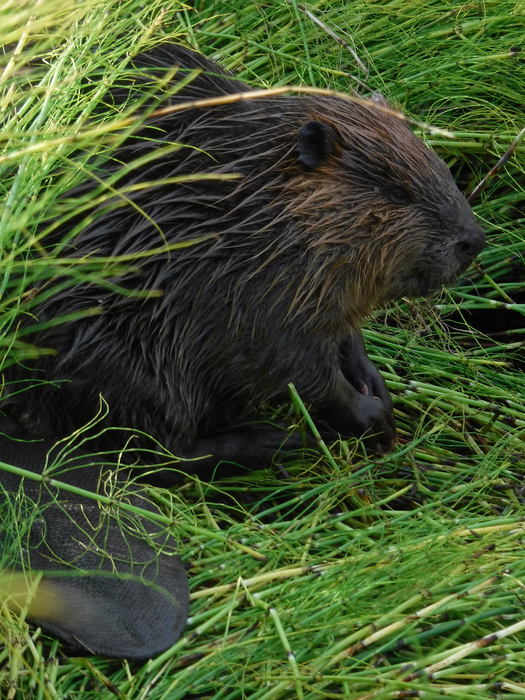A new report has highlighted how beavers are heading further north and are having a significant impact on the landscape of northern Canada and Alaska.

Credit: Please credit Dr Helen Wheeler, Anglia Ruskin University
A new report has highlighted how beavers are heading further north and are having a significant impact on the landscape of northern Canada and Alaska.
The Arctic Report Card 2021 report, published this month by the US National Oceanic and Atmospheric Administration (NOAA), describes how the North American beaver (Castor canadensis) has expanded its range in recent years and is now colonising Arctic territory.
Authored by members of the Arctic Beaver Observation Network (A-BON), including Dr Helen Wheeler of Anglia Ruskin University (ARU), the report details how scientists are using satellite imagery to plot the beavers’ march into the Arctic tundra.
Over 12,000 beaver ponds have so far been mapped in western Alaska, with most areas seeing a doubling in the last 20 years. In comparison, analysis of aerial photography of coastal areas of western Alaska from between 1949-55 found no beaver ponds.
Beavers are a keystone species, capable of changing landscapes by creating new ponds and diverting the flow of rivers. Ponds created by beaver dams increase surface water, which in the Arctic is causing permafrost to melt, in turn releasing the greenhouse gases methane and carbon dioxide.
In western Alaska, research has shown that beavers are the dominant factor in almost two thirds (66%) of cases where surface water has increased. These new ponds can also lead to the introduction of other new species, including fish and invertebrates.
Pond mapping in Canada is now underway and Dr Wheeler is leading the Wildlife Change in the Arctic project in the Mackenzie Delta in Canada’s Northwest Territories to investigate the beavers’ impact on the local environment as well as the Indigenous people who live there.
Dr Wheeler, Senior Lecturer in Zoology at Anglia Ruskin University (ARU), said: “The true impact of the spread of beavers into the Arctic on the environment and the Indigenous communities who live there, is not yet fully known. However, we do know that that people are concerned about the impact beaver dams are having on water quality, the numbers of fish downstream of the dams, and access for their boats.
“The abundance of vegetation, particularly trees and woody shrubs, appears to help beavers to thrive in previously inhospitable terrain, and we are also finding beaver lodges at ever higher elevations, including above the treeline.
“Whether their expansion northwards is entirely due to climate change or increased populations following historical reductions in the trapping of beavers for fur and food, or a combination of the two, is not entirely clear, but we do know that beavers are having a significant impact on the ecosystems they are colonising.”
The new report, Beaver Engineering: Tracking a New Disturbance in the Arctic, is led by Ken Tape, Research Associate Professor at University of Alaska Fairbanks, and involves academics from Wilfrid Laurier University in Canada, the University of South-Eastern Norway, and Anglia Ruskin University (ARU).
DOI
10.25923/0jtd-vv85
Method of Research
Commentary/editorial
Article Title
Arctic Report Card 2021 – Beaver Engineering: Tracking a New Disturbance in the Arctic




